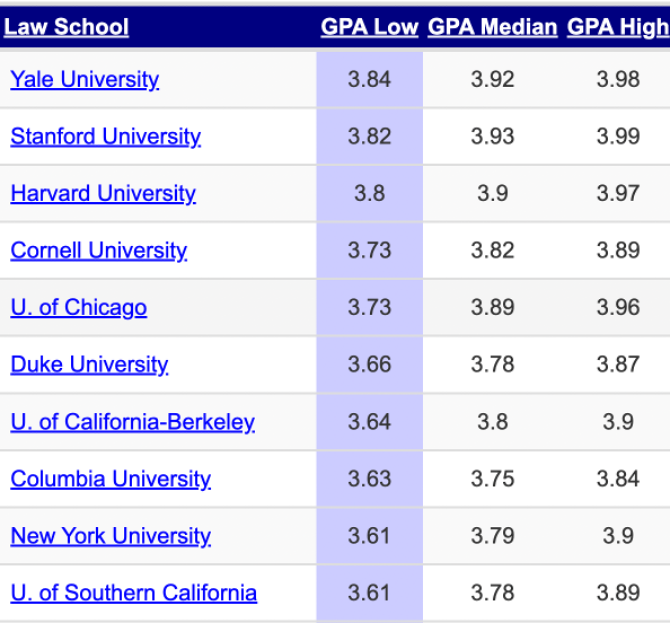Maybe you partied too hard in undergrad. Maybe you had a family emergency or a medical situation, or you had to work while also taking classes, and your grades suffered. Or maybe you just took really difficult courses, and saw your GPA plummet.
Whatever the reason, you’ve heard how important your GPA is to law schools and you’re now looking at your GPA wondering if you’ll be able to get into a top law school, or whether you’ll be able to get into any law school at all.
So to answer your question, Can I still go to law school with a low GPA?
Yes, even with a low GPA, you can get into law school, and even to a top law school.
But first let’s talk about what it means to have a “low GPA.”
What GPA Do You Need for Law School?
If we’re talking about low GPAs, we need to figure out what that actually means. Unlike some obnoxious reddit users who call themselves a low GPA splitter when they have a 3.8 GPA, a low GPA doesn’t just mean a GPA you’re unhappy with.
A low GPA for law schools will entirely depend on your goals. If your GPA is at or below a school’s 25th percentile, your GPA will be considered low for that school.
The below chart shows the schools that demand the highest GPAs:

Source: https://www.ilrg.com/rankings/law/index/1/desc/GPALow
And the next chart shows the schools that accept the lowest GPAs:

Source: https://www.ilrg.com/rankings/law/1/asc/GPALow?name=&state=
So generally, if you’re trying to get into the top schools, a GPA below 3.6 will be considered low.
But to answer the question what GPA do you need to get into law school, any law school, then the answer is at least a 2.5. That is realistically the lowest GPA you can have to get into law school.
But even with a 2.5, you have an uphill battle to climb as that is in the lowest category of GPAs any school accepts.
Ok great, you’re probably thinking, I have an OK GPA, it’s more than a 2.5, but it’s too low for my dream school still. In this hyper competitive admissions environment, can I actually get into a law school where my GPA is significantly low for that school?
Yes. And I can prove it to you.
Can I Still Go to Law School with a Low GPA?
Ok, the good news is that even with a low GPA, however that is defined for you and your goals, you can still get into your dream law school.
Just take a look at some of my recent clients, who if you just looked at their GPAs, should not be at the schools they’re at right now. These clients applied during one of the most competitive admissions cycles in recent history. (initials used to protect their anonymity).
E.D. 3.2 GPA, 171 LSAT 3.2 vs 3.84 median
- Attending University of Michigan Law School, GPA range 3.84, LSAT median 171
D.O. 3.2 GPA, 156 LSAT 3.2 vs 3.82 median
- Attending S.J. Quinney School of Law, GPA median 3.82, LSAT median 163
M.H. 3.0 GPA, 153 LSAT 3.0 vs. 3.64 median
- Attending University of Houston Law School, GPA median 3.64, LSAT median 161
E.C. 2.8 GPA, 157 LSAT 2.9 vs 3.39 median
- Attending Rutgers with scholarship, GPA median 3.39, LSAT median 157
T.S. 3.0 GPA, 162 LSAT 3.0 vs. 3.57 median
- Attending American, GPA median 3.56, LSAT median 161
D.C. 3.6 GPA, 170 LSAT 3.6 vs 3.85 median
- Attending Georgetown, GPA median 3.85, LSAT median 171
I hope this convinces you. You CAN still go to law school with a low GPA.
And you can still go to your DREAM law school even with a low GPA.
But what was it about these applicants that made law schools want to accept them, despite their GPAs being significantly below their medians?
Why did law schools still believe they would be able to handle the rigors of law school and law life, even though they didn’t have the GPA to prove it?
Oftentimes when I share these stats of my clients, people assume these applicants must’ve done something like cured cancer, or overcame a serious tragedy, or (the most aggravating assumption), were underrepresented minorities.
While these applicants did have a lot to share, bluntly, they were not extraordinary. They all had more to talk about than Greek life, but they didn’t do anything super unique or special.
What they did do, is use their application to show admissions officers that their GPA wasn’t reflective of their capabilities, and that they did indeed, despite their GPA, have what it takes to be a successful law student and effective attorney.
Now let’s talk about how to get into law school with a low GPA.
How to Get Into Law School With a Low GPA
1. Work After Undergrad
The more time between your undergrad grades and when you apply to law school, the less your low GPA will impact you.
If you just graduated college, you can’t really claim that your GPA is not reflective of your maturity or capabilities. But if you have at least a few years of time after undergrad, and you weren’t just putzing around during those years, you can convince law schools that you’ve matured since then.
It also will help if your work experience after undergrad is something substantive and demanding, and you can show that you succeeded in that environment. By having this kind of real-life experience already, you’re showing law schools with proof that you have what it takes to thrive in the same environment as law.
Law schools seem to be increasingly trending towards favoring those with some work experience over those coming straight through from undergrad. And in fact, all of the clients I mentioned above who got into their dream schools with low GPAs, had at least two years of work experience post undergrad.
2. Continue Your Education…And Do Well
Pursuing a graduate degree or even taking post-grad non-degree bearing courses can help show that you have what it takes to handle the rigorous academic environment of law school.
But the key is . . . you have to do well. Really well.
I wouldn’t suggest pursuing and paying for a random Master’s just to have more grades. You can take single courses at your local college or typically your alma mater. You want these courses to be graded though, so pass/fail won’t help much unless you can secure a fantastic (and I really mean FANTASTIC) letter of recommendation.
If you there is a graduate degree program that is in line with your interests, and in line with what you want to do as a lawyer, that can be a good way to further your application and simultaneously show that you can do well academically.
3. Have a Strong LSAT.
Having a strong LSAT can help counteract a low GPA.
But as you’ll notice from the stats of my clients above, you don’t actually have to have a ridiculously high GPA.
While a higher LSAT will certainly help and make it easier to get admitted, contrary to popular belief, you don’t have to have a LSAT score so high out of the law school’s range. In fact, some of those clients above were admitted even when their LSAT scores were at or even below the median.
So good news! You don’t have to drive yourself entirely crazy thinking you have to get a perfect 180 just because you have a low GPA.
4. Present Robust Letters of Recommendations
Letters of recommendations for law school are something too often overlooked. They are vitally important if you want to get into law school with a low GPA.
Since the biggest fear of admitting an applicant with a low GPA is that he/she/they won’t succeed academically, your best letters will be those that show how you have succeeded in a rigorous academic environment in the past.
Professors will be the most obvious choice for this, but if you’re a few years removed from undergrad a letter talking about how you go above and beyond in a rigorous professional environment will also be impactful.
With a low GPA, it can often feel like you have no one who could write about your academic achievements. But even if you didn’t get an A in a particular class, you should still think about whether you can get a powerful recommendation. Maybe, even though you didn’t get an A, it was a really tough course and you showed extraordinary interest and passion for the topic. Maybe getting a B in that course is an achievement. You’d of course want the professor to say such things in their letter.
But academic letters can also come from those outside your classroom professors. Did you do any research or work on a significant project where a professor supervised you? Those can also be good people to ask for letters.
When asking your recommenders, make sure to give them guidelines about what you want them to talk about. For an applicant with a low GPA score, you’ll want to make sure they highlight specifically how you have already shown that you have the academic capabilities and character traits to succeed in a demanding environment like law school.
5. Write an Addendum Explaining Your Low GPA
For applicants with a truly low GPA, I do suggest writing an addendum. If you are trying to get into a Tier 1 school, and don’t really have a valid reason for a 3.6 other than you took tough courses or you just partied too much, that’s probably not worth explaining.
But anything below a 3.3, there is typically something to explain.
The following are some valid explanations for a low GPA, worthy of writing an addendum:
- Working While in College to Support Yourself. For this to be a valid explanation, this needs to be significant work experience, not just a few hours a week. But if you were someone who had to support yourself through school, and were working 20+ hours/week while also in school full-time, this is an understandable and legitimate reason for a lower than desired GPA. Law schools will not entirely forgive your GPA, but they will be much more understanding.
- Personal or Family Difficulty. If you went through a personally difficult time that legitimately impacted your performance, schools will be sympathetic to that. But make sure the narrative checks out. For instance, if you talk about your GPA being impacted by a tragedy, your grades before the tragedy should not be similarly lackluster. I’ve advised clients to explain lower grades for things such as: sexual assault, family/friend death, serious illness of self or family member, witness to violence.
- Trouble Acclimating to College. If your grades were poor in the beginning of your college experience, but then you turned them around, this is definitely a trend worth highlighting and pointing out. Many students struggle to transition to college, and if you have proof that you then were able to thrive and succeed after finding your footing, law schools will be pretty forgiving of the lower grades in the beginning.
- Participation in Intercollegiate Athletics. This reason for low grades can often feel more like an excuse than an explanation. But if you were a Division 1 athlete and spent significant time training and traveling for competitions, that is a big time commitment that you cannot spend studying and is something worth explaining. Something I often find is worth explaining for athletes, is if they were over ambitious in what they thought they could handle in the beginning of their college career. Maybe they took too many courses, or pursued too rigorous a major, underestimating how much time their athletics would take up. This is a great explanation if you have a positive grade trend on your transcript (i.e., your grades improved as you learned how to manage your time and expectations better). Just know, that there are still many top athletes who still do perform well academically, so this won’t entirely forgive you, but it will help give law schools context and will help separate you from those who were just partying too hard.
- Nontraditional Applicant with Successful Career or Real World Experience. If you are a nontraditional applicant (typically at least five years out of college) applying after having a successful career, or having gained significant real-world experience, and had a low GPA in college, you should definitely write an addendum explaining how you have changed since undergrad. Law schools are very forgiving to nontraditional applicants if they have then proven they can handle rigorous environments (especially if related to the skills you’ll use in law school). You will want to demonstrate how your GPA from college is a reflection of your immaturity, and show how what you’ve done since college has given you a new set of skills and understanding of what it takes to succeed. For instance, maybe you joined the military and learned discipline and leadership. Or you then went on to grad school or took further college courses and succeeded. Maybe you became a parent or thrived in a professional job, and now know what it takes to succeed.
- Undiagnosed or Unmanaged Learning Disability – that is now managed. This can be a tricky decision on whether and how to explain a learning disability. You don’t want to sound like you’re making an excuse, and you certainly don’t want to show that you cannot succeed in law school. So I suggest you write an addendum about a learning disability in order to explain low academic performance if it was diagnosed in the middle of your college experience (and you can show that your grades improved after you received accommodations) or you can show that you have a diagnosed learning disability but were denied the proper accommodations. Using the latter—being denied proper accommodations—can be tricky to write without sounding like you’re just bitching. The best way to support this kind of claim is by attaching a letter from a professional saying you should have received accommodations and that with proper accommodations you can thrive. Be wary of including too much detail about your disability. Just state the facts simply and succinctly and don’t provide any room for law schools to doubt your ability to succeed in law school.
Discover more about How & When to Write a Law School Addendum, along with sample addenda.
6. Write a Winning Personal Statement
Writing a personal statement that stands out and shows not just who you are and what you’ve done, but also how you think can go a LONG way to getting you admitted into law school with a low GPA.
In fact, it is the thing that will likely get you admitted to law school even with a low GPA.
My clients who got into their dream law schools despite not having the LSAT score to match, did exactly that. It was their personal statement that made them stand out.
How did they stand out? They showed admissions officers through their personal statement that they were someone who could think critically and complexly. i.e., they used their personal statement to show law schools that they had the exact traits they needed to succeed in law school: critical thinking and writing abilities.
Learn How to Write a Winning Personal Statement.
Do not underestimate the impact of a powerful personal statement.
If you have a low GPA, your personal statement is one of the primary things you can now control. Don’t waste the opportunity to show law schools that you are more than your LSAT score.





